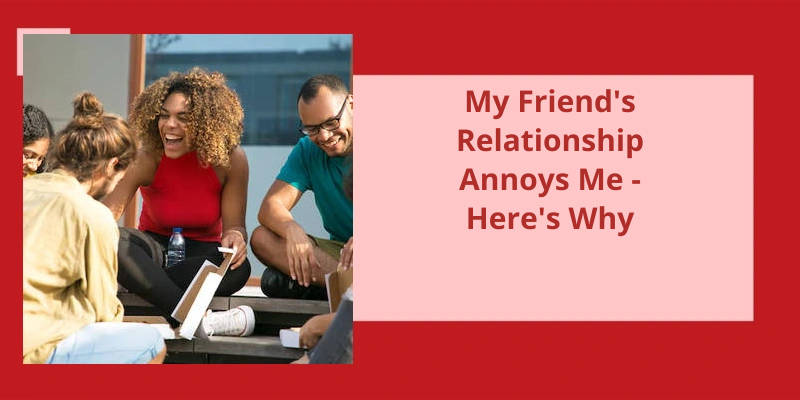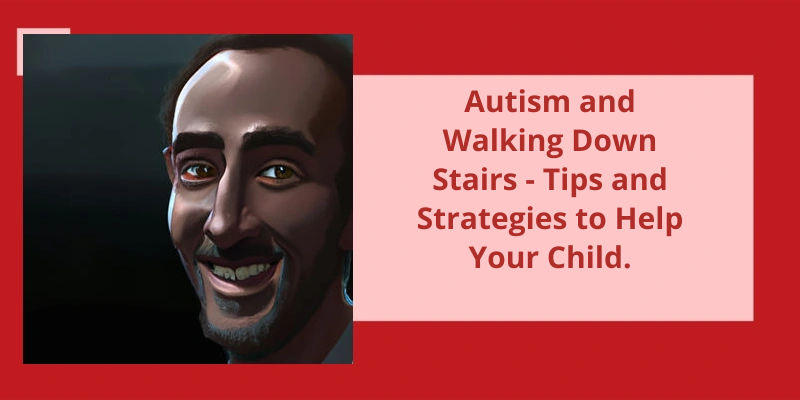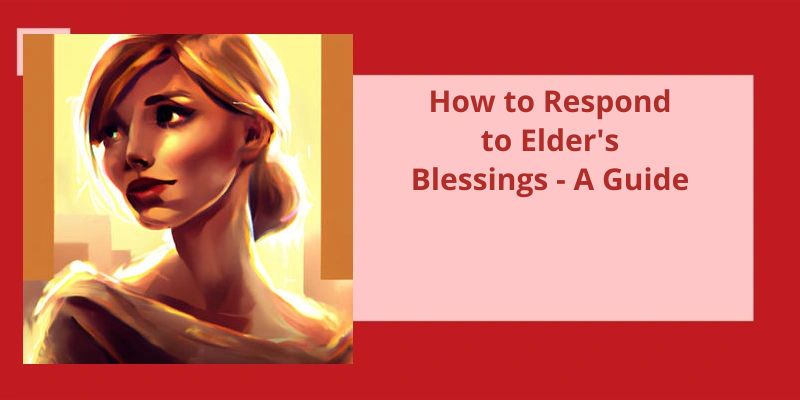Have you ever found yourself in a situation where your friend's relationship starts to grate on your nerves? You watch as they navigate the ups and downs of their partnership, and although you want to be supportive, it becomes increasingly difficult to hide your annoyance. Perhaps it's because their significant other constantly monopolizes their time, leaving little room for your friendship to flourish. Or maybe it's the way they prioritize their partner's needs over everything else, including your own. Whatever the reason, you can't help but feel frustrated and even a bit resentful towards their relationship. In this article, we will explore the reasons why your friend's relationship may be getting on your nerves and offer some strategies to cope with these feelings in a healthy and constructive manner.
Why Does My Partner Get Annoyed at Everything I Do?
You might unknowingly have become his emotional dumping ground, where he vents out all his frustration and irritation. This constant state of being annoyed could also be a symptom of a deeper issue within your relationship. It’s possible that he’s feeling unfulfilled or dissatisfied, leading to a general sense of annoyance towards everything you do.
Another possibility is that your partner is struggling with their own emotional regulation. They may have difficulty managing their emotions and therefore, small triggers easily annoy them. This could be a sign of underlying stress, anxiety, or even unresolved past trauma. In such cases, it’s important to encourage open communication and support them in seeking professional help if needed.
It’s also important to examine whether there are any unhealthy dynamics or patterns in your relationship that are contributing to your partners constant annoyance. Lack of effective communication, unresolved conflicts, or unequal distribution of responsibilities can all create a tense and frustrating environment, making your partner easily annoyed.
Additionally, your partners annoyance could be a reflection of their own insecurities or low self-esteem. They may be projecting their own self-critical thoughts onto you, leading to heightened sensitivity and irritability. It’s crucial to foster a supportive and nurturing environment that allows for personal growth and self-acceptance.
It isn’t your responsibility to fix or change their behavior. Focus on your own well-being and mental health. If their constant annoyance becomes draining and toxic, it may be necessary to reassess the future of the relationship and consider seeking professional guidance or support from friends and family.
Strategies for Improving Emotional Regulation in Relationships
Improving emotional regulation in relationships can be beneficial for managing potential conflicts and fostering better communication. Here are a few strategies that can help:
1. Self-awareness: It’s essential to develop an understanding of your own emotions and triggers. Take time to recognize and reflect on how you feel in different situations to better regulate your emotions.
2. Active listening: Practice active listening skills to truly understand and empathize with your partner’s perspective. This helps create a safe space for open communication and reduces misunderstandings.
3. Mindfulness: Engaging in mindfulness practices, such as meditation or deep breathing exercises, can promote emotional self-regulation and increase your ability to respond rather than react impulsively in challenging situations.
4. Effective communication: Learn and practice assertive communication techniques to express your emotions constructively while respecting your partner’s feelings. Using “I” statements and avoiding blame can facilitate healthier discussions.
5. Conflict resolution: Develop conflict resolution skills to address disagreements calmly and rationally. This involves finding compromises, seeking common ground, and focusing on problem-solving rather than winning or proving a point.
Remember, improving emotional regulation takes time and effort from both partners. It’s essential to support each other’s growth and encourage open dialogue about emotions to foster a healthier and more satisfying relationship.
Three, you might be concerned that their relationship will change the dynamics of your friendship or that you’ll be left out. It’s natural to feel a sense of loss or fear of being replaced when a close friend enters a romantic relationship. These emotions can be complex and sometimes difficult to navigate, but understanding why you feel this way can help you address and overcome these feelings.
Why Do I Feel Sad When My Friend Gets in a Relationship?
Three, you might be afraid of losing the special bond and connection you’ve with your friend. When they enter into a romantic relationship, it can sometimes feel like they’re drifting away from you, focusing more on their partner than on your friendship. This fear of losing them can lead to feelings of sadness and anxiety.
Four, you may also feel left out or excluded from their new relationship. Suddenly, your friend has a new person in their life who becomes their go-to person for everything, and you might find yourself left on the sidelines. It’s natural to feel jealous or left out in this situation, especially if you were used to being their confidant and supporter.
Five, it’s possible that you’re feeling neglected or overlooked when your friend enters into a relationship. They may not have as much time or energy to spend with you as they did before. This change can be difficult to accept, especially if you relied on their presence for emotional support or companionship.
Six, it’s important to recognize that these feelings are valid, but it’s also crucial to communicate openly with your friend about how youre feeling. They may not be aware of the impact their relationship is having on your emotions, and discussing your concerns can help strengthen your friendship.
Overall, feeling sad when your friend gets into a relationship is a complex mix of emotions. It’s essential to process and understand these feelings before they strain your friendship. Remember, it’s normal to have a range of emotions about this situation, but with open communication, you can work through these feelings and maintain a strong bond with your friend.
The Importance of Self-Reflection and Self-Care When Dealing With Emotions Related to Friends Entering Relationships.
- Recognizing and acknowledging your emotions
- Taking time to process your feelings
- Engaging in self-reflection
- Identifying any patterns or triggers
- Practicing self-compassion and self-care
- Setting boundaries for yourself
- Seeking support from trusted friends or professionals
- Exploring hobbies and activities that bring you joy
- Creating a self-care routine
- Focusing on personal growth and self-improvement
- Acknowledging that your feelings are valid
- Learning to communicate your emotions effectively
- Understanding that everyone’s journey is different
- Accepting and embracing change
- Practicing gratitude and mindfulness
- Taking responsibility for your own happiness
However, there’s a difference between occasional annoyance and chronic frustration. If your partner seems to be constantly irritated or annoyed with you, it may be worth exploring why that is. In this article, we will discuss some potential reasons why your partner might get annoyed with you and how to address these issues in a healthy and constructive manner.
Is It Normal for Your Partner to Get Annoyed With You?
Is it normal for your partner to get annoyed with you? Even those in healthy relationships can get wound up by their partner(s) every now and then, and that’s totally normal. You are, after all, two (or more, if youre polyamorous) humans trying to enmesh your lives despite being separate entities. A bit of annoyance is to be expected.
However, when it comes to your friends relationship, it may be a different story. Perhaps their partners behavior consistently annoys you, or maybe they seem to put up with things that you find intolerable. It can be challenging to navigate these emotions, especially when you care about your friend and want the best for them.
One possibility is that you perceive your friends partner as mistreating them or being disrespectful. It’s common to feel protective of those we care about, and if you witness behavior that you believe is harmful, it’s natural to feel annoyance towards the person responsible. It’s important, though, to approach such situations with sensitivity, as your friends perspective may differ from yours.
Another reason for your frustration could be related to personal boundaries. Your friends relationship dynamics might be vastly different from your own, and what might annoy you may be completely acceptable or even enjoyable for them. Recognizing and respecting these differences can help you better understand and accept their choices.
Additionally, your annoyance may stem from feeling like your friends partner is monopolizing their time or influencing their decisions in a negative way. This can leave you feeling neglected or that your friend has changed since entering the relationship. Communicating your concerns with your friend in a non-judgmental and understanding manner could help bridge any gaps and strengthen your bond.
Ultimately, it’s important to remember that every relationship is unique, and what works for one person may not work for another. While your annoyance may be valid, it’s essential to approach the situation with empathy and open communication. Remember, your friends happiness and well-being are important, and supporting them through their relationship challenges can be a testament to your friendship.
How to Address Annoyance in a Healthy Way Within a Relationship
Addressing annoyance in a healthy way within a relationship is crucial for maintaining a strong bond with your friend. Open and honest communication is key. Start by expressing your feelings calmly and respectfully, using “I” statements to avoid sounding accusatory. Share specific instances where you felt annoyed and explain why they bothered you. It’s essential to actively listen to your friend’s perspective as well, and try to understand their point of view. Together, brainstorm potential solutions or compromises that can help alleviate the annoyance for both parties. Remember, a healthy relationship requires understanding, empathy, and a willingness to work through challenges together.
By acknowledging your partner’s emotions and providing validation, you can foster a sense of understanding and empathy in your relationship. It’s important to approach the situation with patience and a willingness to compromise, as this can help defuse tension and promote open communication.
How Do You Deal With an Irritated Partner?
When dealing with an irritated partner, it’s crucial to approach the situation with empathy and active listening. To avoid exacerbating their anger, it’s important to genuinely listen to them until you’re certain they feel heard and understood. Dig beneath the surface and make an effort to comprehend their deepest needs, desires, and frustrations. By doing so, you demonstrate your willingness to understand and empathize with them.
Validation plays a key role in effective communication and relationship building. By affirming and acknowledging your partners feelings and experiences, you communicate acceptance of both them and their emotions. Validating their perspectives doesn’t necessarily mean you agree with everything they say, but rather that you recognize their emotions are real and legitimate. This simple act of validation can go a long way in diffusing their anger and fostering understanding between both parties.
Additionally, it’s important to avoid dismissive or belittling behavior when dealing with an irritated partner. Minimizing their concerns or making them feel insignificant will only further escalate their emotions. Instead, practice patience and compassion, even if you may not fully understand or agree with their perspective. Strive to create an environment where open, honest, and respectful communication can take place.
Furthermore, it can be helpful to explore potential underlying causes of their irritability. Perhaps they’re dealing with stress, anxiety, or other personal issues that are influencing their behavior. Encouraging open and honest dialogue about these underlying issues can provide an opportunity for both of you to better understand and support each other.
Lastly, it’s essential to recognize that everyone has their own limits when it comes to dealing with anger. It’s okay to set boundaries and take care of yourself if you feel overwhelmed or consistently affected by your partners irritability. Communicate your needs and concerns, but also be willing to listen and work together towards a healthier and more harmonious relationship.
Conclusion
In conclusion, it isn’t uncommon for friendships to be tested by the dynamics and behaviors of those closest to us. While it may be natural for certain aspects of our friends' relationships to annoy us, it’s essential to approach these feelings with empathy and understanding. Instead of focusing on judgment and frustration, we can choose to communicate openly and honestly with our friends, expressing our concerns in a non-confrontational manner. It’s crucial to remember that everyone's journey is unique and that what may seem incomprehensible or irritating to us might hold deeper meaning and significance for our friends. By fostering a culture of empathy, respect, and open dialogue, we can navigate these challenging situations while preserving the bonds of our friendships.






